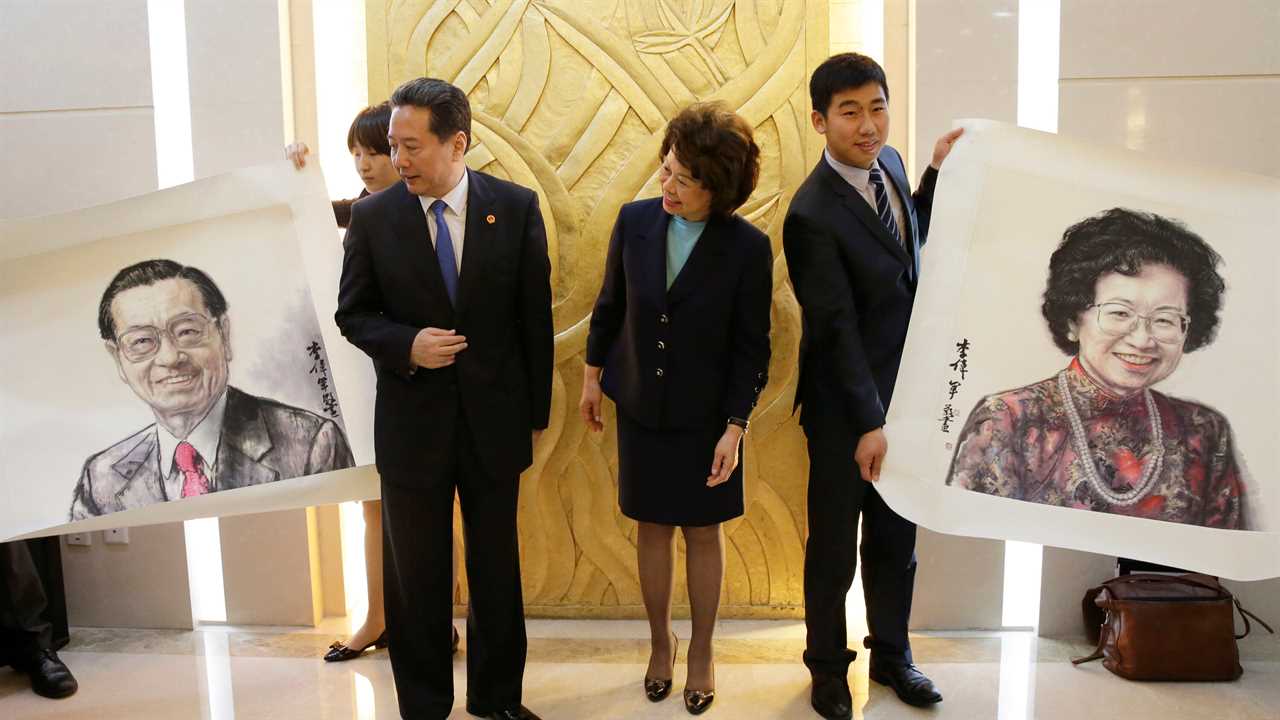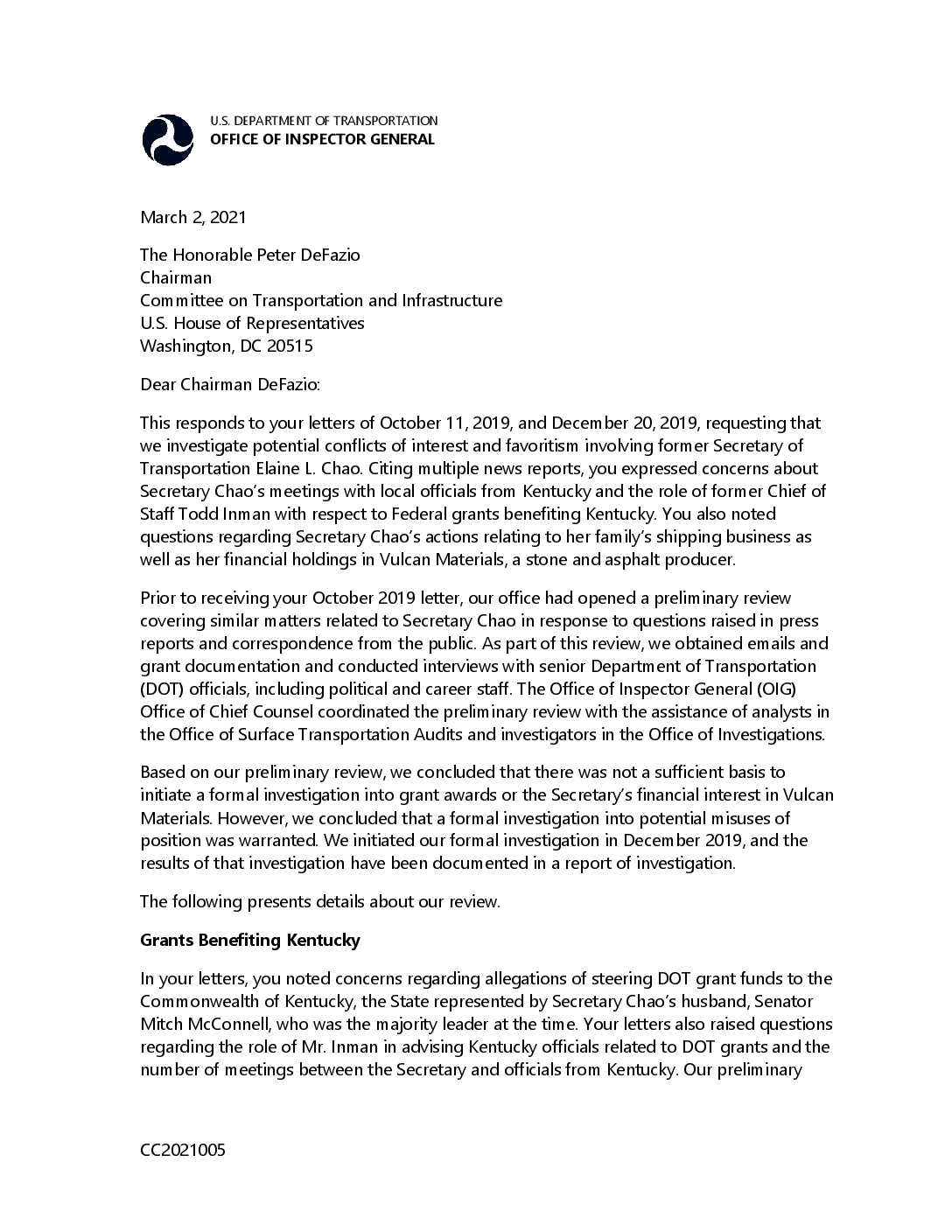
WASHINGTON — It was late summer 2017, and staff members at the Transportation Department were working feverishly to nail down details for the first planned trip to Asia by their boss, Elaine Chao, a visit that was slated to include meetings with senior government officials in China.
But alarm bells were going off in the department’s general counsel’s office. Ms. Chao’s aides had been instructed to include her father and sister — who ran a global shipping business with major operations in China — in high-level meetings during the trip.
Ethics lawyers quickly flagged the plans as problematic, noting that they could benefit the Chao family business, the Foremost Group, in an industry overseen by the Transportation Department.
“The ethics team expressed concerns that if the secretary were to engage in ‘public diplomacy’ events at locations closely connected with the Foremost Group, it would provide an inappropriate advantage, in the form of publicity, to Secretary Chao’s family’s business,” notes taken by Transportation Department lawyers in September 2017 said.
The notes, made public this week in a new report issued by Transportation Department’s inspector general, show how officials in the department were worried early in Ms. Chao’s tenure about what the inspector general would later determine to be a pattern of using her office to benefit her family.

Read the document
Inspector General Investigation of Transportation Secretary Elaine Chao
Read Document 44 pagesThe ethics concerns reached Jeffrey A. Rosen, then the Transportation Department’s deputy secretary, who later moved to the Justice Department.
More than three years after the ethics lawyers raised concerns about Ms. Chao’s trip to China — which was later canceled — Mr. Rosen was the deputy attorney general in the closing weeks of the Trump administration when the inspector general referred the findings about the mixing of Ms. Chao’s official duties and family business for possible criminal investigation. Two divisions of the Justice Department declined in mid-December to open an investigation.
There is no indication that Mr. Rosen was involved in that decision. He could not immediately be reached for comment. A voice message left at a number associated with his home was not returned, nor was an email sent to his personal account.
But the sequence of events has put new attention on how the Justice Department under the Trump administration handled a decision not to undertake a criminal investigation of Ms. Chao, a prominent cabinet member who is married to one of the most powerful Republicans in Washington: Senator Mitch McConnell of Kentucky, the minority leader.
The inspector general’s report has provided new details of how Ms. Chao’s role as transportation secretary intersected with her role as a member of a family with a huge financial stake in the shipping industry.
A spokesman for Ms. Chao said on Wednesday that the report had cleared her of any wrongdoing. The report did not conclude that Ms. Chao had violated any ethics rules or laws, but detailed examples of how she had used or sought to use her office to promote her family.
Ms. Chao’s staff seemed to show little hesitation about the work they were doing in 2017 to make arrangements for her father, James Chao, then the chief executive of Foremost, who was known among the Transportation Department’s staff as Dr. Chao. He had received several honorary doctorates.
“Above all, let’s keep” the secretary happy, one aide to Ms. Chao said in an email exchange in October 2017, as the planning for the China trip continued even after the ethics lawyers had raised their concerns. “If Dr. Chao is happy, then we should be flying with a feather in our hat.”
House Democrats said the sequence of events made clear that Ms. Chao had used her office to benefit her family — issues raised by The New York Times in 2019, when it first reported on her planned trip to China.
“Secretary Chao’s flagrant abuse of her office provides further evidence that additional ethics and transparency reforms are needed,” Representative Carolyn B. Maloney, Democrat of New York and the chairwoman of the House Oversight and Reform Committee, said in a statement after the inspector general’s report was released on Wednesday.
Foremost, the company Mr. Chao ran until 2018 and which is now run by Ms. Chao’s sister, Angela, has received hundreds of millions of dollars in loan commitments from a bank run by the Chinese government to build new dry-bulk freight ships at Chinese government-owned shipyard in Shanghai. In January 2017, Angela Chao became a director of Bank of China, one of the country’s top four lenders.
The planning for the trip to China included discussions of a meeting with Mr. Chao and a “former high-level Chinese official” who had been one of his school classmates and now lived in Shanghai, the inspector general’s report said. The report does not name the former government official, but Jiang Zemin, the former Chinese president, attended the same university as Mr. Chao in the late 1940s in Shanghai. That school — Shanghai Jiao Tong University — was on the planned itinerary.
Mr. Chao regularly met Mr. Jiang on his trips to China. During Mr. Jiang’s tenure at the head of the ruling Communist Party from 1989 to 2002, the two met at least six times, The Times reported in 2019. Notably, Mr. Jiang received Mr. Chao and his wife at a villa inside the Communist Party’s Beijing leadership compound in late August 1989, near the site of the bloody Tiananmen Square crackdown that had taken place less than three months earlier.
Ms. Chao’s trip was ultimately canceled only a few weeks before it was scheduled to take place — and after airline tickets had been purchased — when State Department officials raised their own ethics concerns.
Four days before Mr. Rosen took part in the discussion on ethical issues, Ms. Chao was present with her father and sister at New York’s Harvard Club for the signing of a contract with a Japanese shipbuilder to deliver two freighters to Foremost, according to a report by a Chinese news media company.
In 2018, staff members from Ms. Chao’s office helped edit chapters from a biography of Mr. Chao, even though one “staffer acknowledged the publication did not have any D.O.T.-specific nexus,” the inspector general’s report said. After helping edit the book, Ms. Chao’s staff then built a marketing strategy targeting journalists to “build Dr. Chao’s profile,” and other organizations such as Columbia University and the shipping industry publication Lloyd’s List to promote her family.
Steven G. Bradbury, who was the Transportation Department’s general counsel at the time, told investigators that he was “aware of the topic,” related the family book that agency staff members had worked on, “but it would not be appropriate for the secretary to direct subordinates to work on these publications.”
Transportation Department investigators are obligated to notify the Justice Department when they find evidence of possible criminal activity. It is improper under rules for a federal official to “use his public office for his own private gain, for the endorsement of any product, service or enterprise, or for the private gain of friends, relatives,” under the statute the inspector general used to investigate Ms. Chao.
The Justice Department receives frequent referrals from inspectors general, and decisions about whether to open formal criminal investigations are typically made by F.B.I. investigators and department prosecutors who are not political appointees. But Mr. Rosen, who as of late 2020 served as the deputy attorney general and would become acting attorney general in the final weeks of the Trump administration, was likely to have been informed of the referral involving a cabinet member, even if he was not involved in the decision.
The Justice Department officials notified the Transportation Department inspector general’s office in mid-December that “there may be ethical and/or administrative issues to address” based on the items they had identified, “but there is not predication to open a criminal investigation.”
Maggie Haberman contributed reporting.






